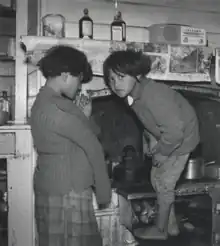Washday at the Pa
Washday at the Pa is a New Zealand illustrated children's book by photographer Ans Westra that describes a day in the lives of a rural Māori family. The book was first published by the government Department of Education in 1964 and distributed to primary schools as a bulletin.[lower-alpha 1]
.jpeg.webp)
The bulletin was quickly recalled, following criticism that its depictions of the poor, rural family were bad for Māori, especially as the primary audience was young children. This decision led to both public and academic discussion over censorship in the following decades.
Soon after its recall from schools, the book was reprinted privately, this time for adults and on the artistic merits of Westra's photography. This new edition featured additional images that were not included in the short children's book, and some text was revised.
A third edition was released in 2011, with new images from Westra's meeting again with the family in 1998.[2]
Publication, withdrawal and republication
Westra visited with and photographed rural Māori throughout the country for five months,[3] and, in 1964, Washday at the Pa was published as a school bulletin[lower-alpha 1] by the school publications section of the Department of Education. The bulletin was printed by the government printer, and 38,000 copies were distributed to primary school classrooms throughout New Zealand for use in standards two to five. Editors James K. Baxter and Alistair Campbell of the School Publications had expressed "doubts about the acceptability of the photographs to Māori" prior to publication, but the book was published anyway.[4]

The bulletin tells a visual story of daily life for a Māori family at their rural home. The family was given the fictitious name "Wereta", and described as living "near Taihape" to protect their identities, though the home was actually in Ruatoria, near Gisborne. Scenes focus largely on the family's nine children, mostly playing or getting into mischief, as well as some scenes of domestic chores, and "Mr Wereta" shearing sheep. The rural home had no running water or electricity,[5] and one photograph shows a young girl, Mutu, standing on a wood fire stove to warm her feet.[3] This photo drew particular attention because according to Māori custom (tikanga Māori), feet should never come into contact with areas where food is prepared.[6]
The living conditions of the family were seen as poor, and their rural home rundown. Concerns were raised by the Māori Women's Welfare League that the depiction of the Weretas would lead readers—impressionable children—to see the family and their living conditions as representative of all Māori. A campaign by the league had it that the book would have a "detrimental effect" on Māori people – and that the living conditions portrayed within the book were atypical.[3] It was claimed that: "the Māori school child is immediately placed at a disadvantage with his European schoolfellows and becomes the butt of their derision". The league requested the bulletin's withdrawal from schools, and in August 1964, soon after its release, the journal was withdrawn by order of the Minister of Education.[3] According to records, all 38,000 copies of the bulletin in schools as well as all unsold copies in the Government Bookshops chain were sent to Wellington, and destroyed, but copies have been seen selling for "hundreds of dollars" online.[4]
Later in 1964 Washday at the Pa was republished privately by the Caxton Press in Christchurch, with this second edition including 20 additional photographs.[6][7] The original text, also written by Westra, was revised, which led one critic to question whether the intended audience was adults or children, but noting: "from an artistic point of view one cannot fault Ans Westra's fine photography".[6]
A new edition with photographs taken of the same family in 1998 was published by Ans Westra and Mark Amery in 2011.[8]
Publications
- Washday at the Pa by Ans Westra (Caxton Press, 1964), in particular the enclosed publisher's note.
- Washday at the Pa by Ans Westra (Government Printer, 1964).
- Washday at the Pa by Ans Westra and Mark Amery (Suite Publishing, 2011) ISBN 978-0-473-19846-6
Notes
- A bulletin, also known as a "reader" or "journal", is a short book designed for school children. It is usually short, and is assigned to children based on their age, or level of reading ability.
References
- "Publication: Ans Westra - Washday at the Pa". Suite Gallery. Archived from the original on 25 January 2023. Retrieved 26 February 2023.
- Taylor, Mark (18 October 2011). "Controversial photos go on display". Dominion Post.
- "Washday at the Pa controversy". Collections online. Te Papa. Archived from the original on 10 November 2010. Retrieved 5 March 2023.
- Stewart, Georgina; Dale, Hēmi (26 February 2018). "Reading the 'ghost book': Māori talk about Washday at the Pā, by Ans Westra". Video Journal of Education and Pedagogy. 3 (1): 2. doi:10.1186/s40990-018-0014-2. hdl:10292/12833. ISSN 2364-4583.
- Catherall, Sarah (29 November 2019). "At times unwelcome, Ans Westra documented Māori when no one else was". Stuff. Retrieved 2 May 2023.
- Ruha, P. J. (March 1965). "Review of Washday at the Pa". Books. Te Ao Hou. Wellington: National Library of New Zealand (50): 58. Retrieved 7 June 2014.
- Handboek: Ans Westra Photographs, 2004, published by Blair Wakefield Exhibitions
- Suite Gallery (2011). "Ans Westra's "Washday At The Pa" Republished". scoop.co.nz. Retrieved 19 October 2011.